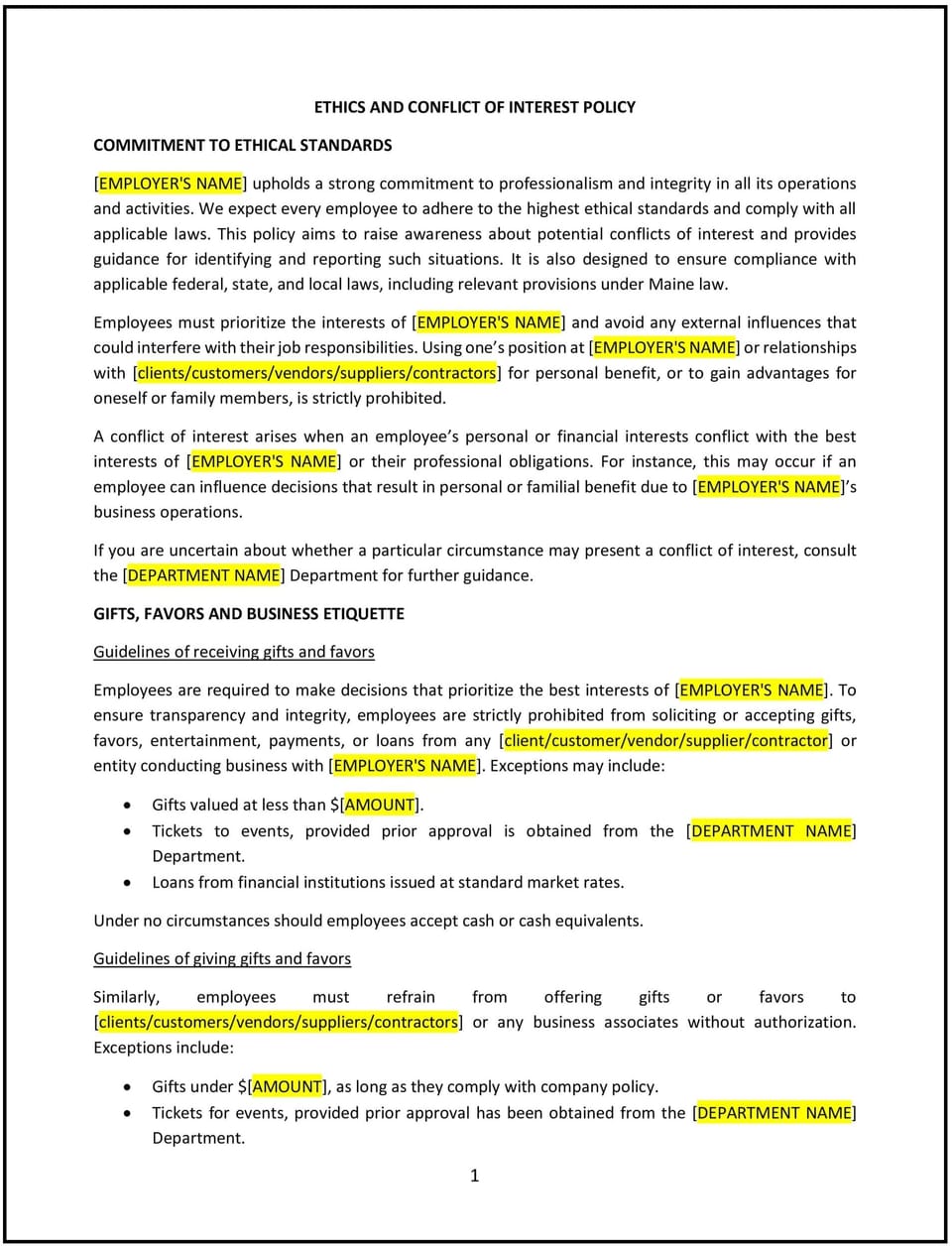Ethics and conflict of interest policy (Maine): Free template

Ethics and conflict of interest policy (Maine): Free template
This ethics and conflict of interest policy is designed to help Maine businesses establish clear expectations for ethical behavior and address potential conflicts of interest in the workplace. It outlines standards for decision-making, disclosure requirements, and procedures for managing conflicts, ensuring integrity and accountability.
By implementing this policy, Maine businesses can promote transparency, protect their reputation, and support compliance with applicable laws and regulations.
How to use this ethics and conflict of interest policy (Maine)
- Define ethical standards: Clearly outline the business’s expectations for integrity, honesty, and professionalism in all activities.
- Identify conflicts of interest: Provide examples of situations that may create conflicts, such as personal relationships, outside employment, or financial interests.
- Establish disclosure requirements: Require employees to disclose potential conflicts of interest to a designated manager or compliance officer.
- Address prohibited behaviors: Specify actions that are not allowed, such as accepting inappropriate gifts, using company resources for personal gain, or making decisions that benefit oneself over the company.
- Include reporting procedures: Provide a clear process for reporting ethical concerns or suspected conflicts of interest, including confidentiality protections.
- Outline disciplinary measures: Specify consequences for violating the policy, such as warnings, suspension, or termination.
- Review regularly: Update the policy to reflect changes in Maine laws, industry standards, or organizational practices.
Benefits of using this ethics and conflict of interest policy (Maine)
Implementing this policy provides several benefits for Maine businesses:
- Promotes integrity: Establishes a culture of ethical behavior and accountability.
- Reduces risks: Minimizes potential legal, financial, or reputational harm from unethical practices or conflicts of interest.
- Ensures compliance: Aligns with Maine and federal regulations governing workplace ethics and transparency.
- Enhances trust: Builds confidence among employees, clients, and stakeholders in the business’s commitment to ethical standards.
- Clarifies expectations: Provides clear guidance on acceptable conduct and decision-making.
Tips for using this ethics and conflict of interest policy (Maine)
- Communicate the policy: Share the policy with employees during onboarding and ensure it is included in the employee handbook.
- Train employees: Provide training on recognizing and managing conflicts of interest and ethical dilemmas.
- Monitor compliance: Regularly review workplace practices and conduct audits to identify potential risks.
- Encourage transparency: Foster an environment where employees feel comfortable disclosing conflicts or ethical concerns.
- Document reports: Maintain detailed records of reported conflicts or ethical issues and the actions taken to resolve them.
- Stay updated: Review Maine laws and regulations to ensure the policy remains compliant and relevant.
Q: What constitutes a conflict of interest under this policy?
A: A conflict of interest arises when an employee’s personal interests interfere with their ability to act in the business’s best interests, such as having financial stakes in a competitor or vendor.
Q: How can businesses ensure employees comply with ethical standards?
A: Businesses can provide training, implement clear disclosure procedures, and conduct regular audits to monitor compliance.
Q: How often should businesses review their ethics and conflict of interest policy?
A: Businesses should review the policy annually or whenever there are updates to Maine laws or changes in business operations.
Q: What steps should employees take to disclose a conflict of interest?
A: Employees should report potential conflicts to their manager or compliance officer using the procedures outlined in the policy.
Q: How can businesses address reported conflicts of interest?
A: Businesses should investigate the issue, consult with relevant parties, and implement solutions such as reassignment or mitigation strategies.
Q: Are employees allowed to accept gifts from vendors or clients?
A: The policy should specify any limits on gift acceptance, such as prohibiting gifts of significant value or requiring disclosure of certain gifts.
Q: What actions can businesses take for policy violations?
A: Businesses can take disciplinary actions, including warnings, suspension, or termination, depending on the severity of the violation.
This article contains general legal information and does not contain legal advice. Cobrief is not a law firm or a substitute for an attorney or law firm. The law is complex and changes often. For legal advice, please ask a lawyer.


